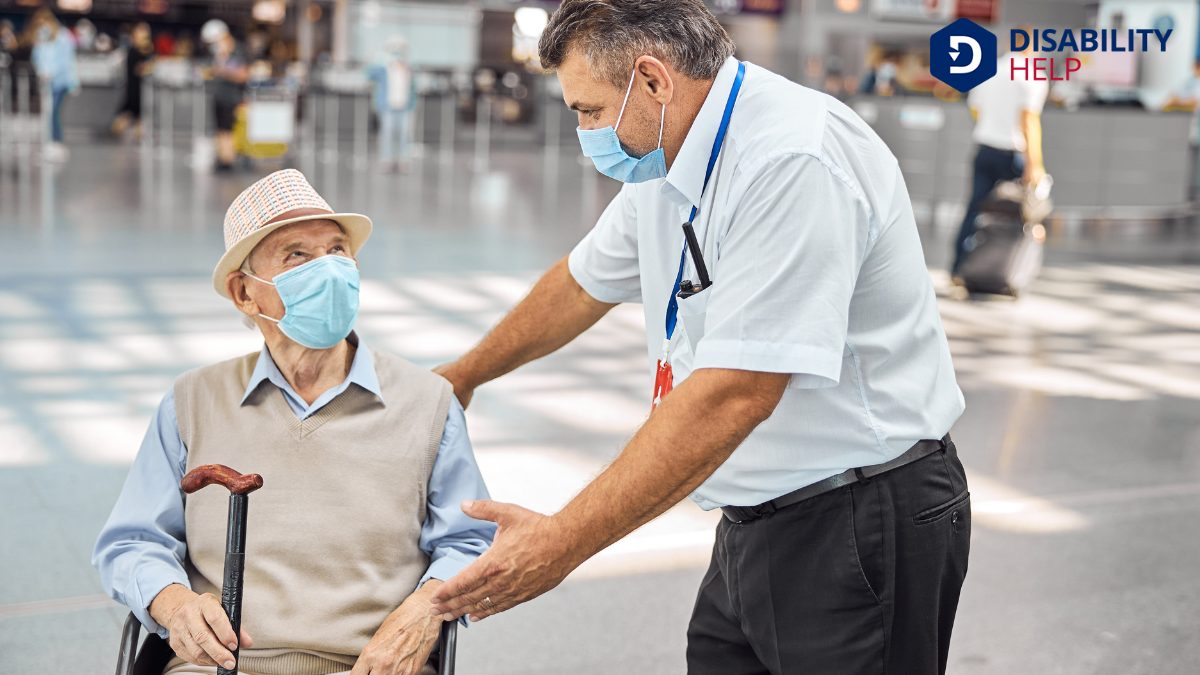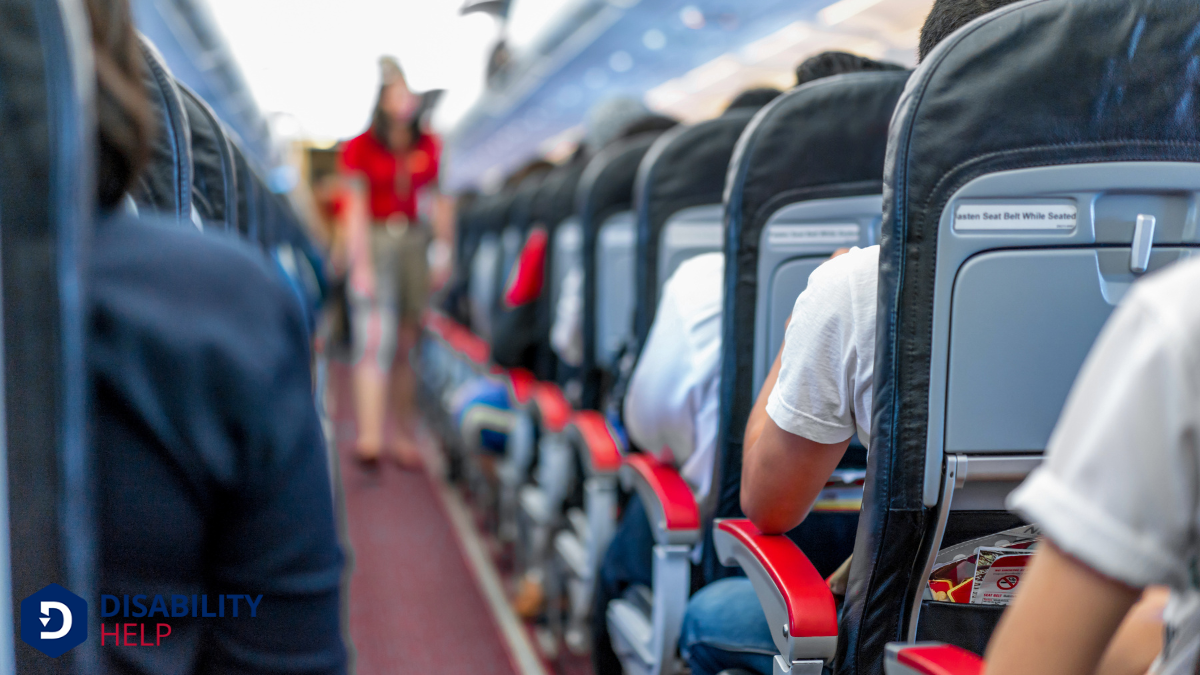Let's consider the complex issue of whether airlines can legally remove disabled passengers. While the Air Carrier Access Act protects against discrimination, safety concerns often take precedence. This legal grey area raises questions about how airlines balance passenger rights and security. How do carriers justify these decisions, and what does it mean for our travel experience? There's much to explore in this nuanced topic, especially in today's ever-evolving travel landscape.
Key Takeaways
- Airlines can remove disabled passengers if there are safety concerns or threats to the passenger or others.
- Non-compliance with crew instructions may result in the removal of a disabled passenger.
- Removal decisions must balance safety with the rights of disabled passengers under the Air Carrier Access Act.
- Legal precedents require airlines to provide reasonable accommodationsModifications or adjustments in healthcare settings to support patients with disabilities. and concrete justifications for denying boarding.
- Staff training and adherence to FAA guidelines ensure safety measures do not discriminate against disabled passengers.
Understanding the Air Carrier Access Act
The essence of accessibilityThe design of products, devices, services, or environments to be usable by people with disabilities.... in air travel is safeguarded by the Air Carrier Access Act (ACAA), a pivotal regulation guaranteeing that passengers with disabilities receive fair treatment.
We recognize that this act prohibits discrimination against disabled passengers by U.S. and foreign airlines operating flights to, from, or within the United States.
It’s vital for us to understand that the ACAA mandates airlines to provide necessary accommodations, such as assistance with boarding and deplaning, at no extra cost.
We must remember that while the ACAA is thorough, it requires airlines to make reasonable adjustments without compromising safety.
Our collective awareness and understanding of this regulation empower us to advocate for equal treatment and to guarantee that all travelers experience dignity and respect during their journeys.
Examining the Rights of Disabled Passengers

When we explore the rights of disabled passengers, it's crucial to acknowledge that these rights are supported by both U.S. law and international standards. The Air Carrier Access Act (ACAA) guarantees that airlines can't discriminate against passengers based on disability. This means they must provide necessary accommodations, like accessible seating and assistance during boarding.
Additionally, airlines should train their staff to handle such needs sensitively and competently.
Globally, the Convention on the Rights of Persons with Disabilities reinforces these commitments, advocating for equal treatment and accessibility.
We must remember that these rights aren't just legal obligations but moral ones. As a community, we should support and advocate for the fair treatment of all passengers, promoting travel experiences that are inclusive and respectful.
Circumstances Under Which Removal May Occur
While the rights of disabled passengers are well-protected, there are certain circumstances where airlines might legally remove someone from a flight. This usually involves safety concerns. If a passenger presents a direct threat to themselves or others, the airline may act to guarantee everyone's safety.
For instance, if a medical condition could worsen during the flight, airlines might decide removal is necessary.
Another scenario involves compliance with crew instructions. If a passenger refuses to follow safety protocols, their removal becomes justified.
Additionally, airlines consider the possible disruption to the flight. If a passenger's behavior might lead to a disturbance, removal could occur.
We must remember, these decisions aren't made lightly and involve careful consideration of all factors involved.
Analyzing Relevant Legal Precedents
As we explore the legal precedents surrounding the removal of disabled passengers from flights, we should consider key court cases that have shaped current practices.
Understanding how disability rightsThe legal and human rights afforded to individuals with disabilities, often the focus of advocacy an... legislation impacts airline policies will help us grasp the broader implications.
Together, we'll examine how these legal frameworks guarantee compliance and protect passenger rights.
Key Court Case Examples
In exploring the legal landscape regarding the removal of disabled passengers from flights, it's essential to examine key court cases that have set significant precedents.
One notable case is *Gilstrap v. United Air Lines, Inc.*, where the court found that airlines must make reasonable accommodations for disabled passengers, reinforcing the importance of balancing safety with accessibility.
Another important case is *Love v. Delta Air Lines*, which highlighted the need for airlines to have concrete justifications when denying boarding to a disabled passenger.
These cases illustrate the courts' stance on ensuring that airlines respect the rights of disabled passengers while also considering safety protocols.
As we investigate these cases, we gain insight into how legal precedents shape airline policies and protect passenger rights.
Disability Rights Legislation
Understanding the intersection of disability rights legislation and air travel is essential for appreciating the protections afforded to disabled passengers. The Air Carrier Access Act (ACAA) plays a pivotal role here, ensuring airlines can't discriminate based on disability.
We see how this legislation requires carriers to make reasonable accommodations, such as boarding assistance and ensuring accessibility of services. As we examine the ACAA, we also recognize the importance of the Americans with Disabilities Act (ADA)A U.S. law that prohibits discrimination against individuals with disabilities in all areas of publi..., which, although primarily focused on ground-based venues, sets a broader precedent for accessibility and non-discrimination.
Together, these laws form a framework that advocates for disabled passengers' rights, ensuring their air travel experience is equitable. These legal protections are vital in safeguarding dignity and equality in air travel.
Airline Policy Implications
While examining airline policy implications, we must explore relevant legal precedents that shape how carriers handle passengers with disabilities. The Air Carrier Access Act (ACAA) is a cornerstone, prohibiting discrimination against disabled passengers. Understanding these precedents helps us see the responsibilities airlines bear in accommodating these passengers.
To grasp the implications, consider the following legal points:
- Air Carrier Access Act (ACAA): Guarantees non-discriminatory treatment.
- Regulatory Compliance: Airlines must adaptA grassroots disability rights organization in the U.S. that focuses on promoting community-based se... policies to align with federal standards.
- Court Rulings: Judicial decisions influence operational adjustments.
- Disability Rights AdvocacyThe act of arguing in favor of, supporting, or defending the rights and interests of individuals or ...: Persistent advocacy impacts policy evolution.
- International Standards: Global agreements can affect U.S. airline policies.
These elements collectively guide airlines in creating inclusive environments. By examining these, we better understand how legal frameworks support passengers' rights and shape airline operations.
Balancing Safety and Accessibility Concerns
As we explore the balance between safety protocols and ensuring equal accessThe principle that all individuals, including those with disabilities, should have equal opportunity... for disabled passengers, it's essential to understand the regulations airlines must follow.
We need to reflect on how these rules impact both passenger safety and the right to accessible travel.
Safety Protocols and Regulations
Balancing safety and accessibility for disabled passengers is a complex challenge that airlines face. We must guarantee safety protocols don’t inadvertently limit access. Regulations require airlines to prioritize everyone’s safety while accommodating those with disabilities. Understanding these protocols is essential.
Here are key points to reflect on:
- FAA Guidelines: Airlines follow Federal Aviation Administration (FAA) rules guaranteeing safety without discrimination.
- Crew Training: Staff undergo training to assist disabled passengers effectively and safely.
- Emergency Procedures: Clear plans are critical to help all passengers, including those with mobility issues, during emergencies.
- Seating Policies: Accessible seating arrangements enhance safety and comfort for disabled passengers.
- Equipment Requirements: Airlines must provide necessary equipment, like aisle chairs, to aid boarding and deplaning.
Ensuring Equal Access
Guaranteeing equal access for disabled passengers on airlines is essential, yet it requires careful consideration to maintain safety standards. We must balance compassionate service with the need for everyone’s protection.
It’s not just about compliance with laws like the Air Carrier Access Act; it’s about fostering an inclusive environment where dignity and safety coexist.
Let’s consider the practicalities: accessible boarding, seating accommodations, and clear communication can make air travel smoother for all.
Airlines need to train staff to understand diverse needs and respond effectively. Passengers, too, can have a role by being aware and supportive.
Steps Towards Ensuring Equitable Air Travel

When we look at the goal of achieving equitable air travel, it's clear that airlines must prioritize accessibility and inclusivity.
It's our responsibility to advocate for changes that guarantee everyone can travel with dignity and ease. Here are some steps we can take:
- Training: Provide thorough training for airline staff on disability awareness and assistance.
- Policy Review: Regularly review and update policies to accommodate the needs of disabled passengers.
- Infrastructure: Invest in accessible infrastructure, such as boarding ramps and accessible restrooms.
- Communication: Enhance communication channels for passengers requiring special assistance.
- Feedback: Establish a robust feedback system to continually improve the travel experience for disabled passengers.
Frequently Asked Questions
How Can Disabled Passengers File a Complaint Against an Airline?
Let's make sure our voices are heard. We can file a complaint with the Department of Transportation's Aviation Consumer Protection Division. Gather details of the incident, submit them online, and follow up for a resolution. Let's advocate for our rights!
What Compensation Is Available for Wrongfully Removed Disabled Passengers?
If we’re wrongfully removed, we can seek compensation like refunds, accommodations, or additional services. It’s essential to document everything, report promptly, and explore legal avenues to guarantee our rights are respected and upheld.
Are There Specific Airlines With Better Accessibility Policies?
We should consider airlines renowned for their accessibility policies, like Delta and Southwest. They’ve made strides in accommodating passengers with disabilities. Let’s research their offerings and choose flights that prioritize inclusivity and a positive travel experience.
How Do Airlines Train Staff to Handle Disability-Related Situations?
We guarantee airlines train staff through thorough programs focusing on empathyThe ability to understand and share the feelings of another, particularly important in understanding..., communication, and practical assistance techniques. They learn to anticipate needs and resolve issues efficiently, fostering an inclusive environment for all passengers. Let's advocate for continuous improvement.
Can Emotional Service Animals Accompany Disabled Passengers on Flights?
Let's address whether emotional service animals can accompany disabled passengers on flights. Airlines often allow them, but rules vary. We should check the airline's specific policy before traveling to verify compliance and a smooth journey.
Conclusion
In steering air travel, we must guarantee the rights of disabled passengers are respected while prioritizing safety. The Air Carrier Access Act is our guide, protecting against discrimination and requiring reasonable accommodations. Although airlines can remove passengers for safety concerns, these actions must be justified. By staying informed and advocating for equitable travel experiences, we can work towards a future where accessibility and safety coexist harmoniously, guaranteeing everyone can fly with dignity and respect.






